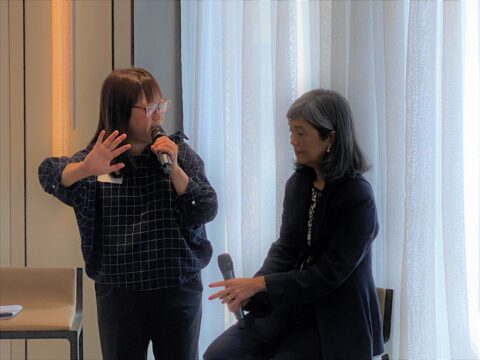Top Story
Up Close and Personal feat. Cecilia Tan, Sasseur REIT
For the final instalment of the ‘Up Close and Personal’ series this year, we had the pleasure of hearing from Cecilia Tan, CEO Sasseur REIT.
5 November 2022
Rika Ogawa, BlackRock
In a recent WLI SG Insider Series, Karen Tay Koh was invited to speak about senior living and the convergence of healthcare and hospitality. This session was moderated by one of the Steering Committee members, Angela Lee, Managing Director, Asia Pacific and Principal at HKS. Karen had an illustrious career which begin in the Ministry of Finance and included positions such as the Deputy CEO of Singhealth and Singapore General Hospital, she also provided advisory services for clients at prestigious hospitals, before being appointed as CEO of IP Investment management Singapore which invests in alternative assets like student housing in the UK and multi-family assets in the US. With such experience, she was uniquely positioned to speak on the topic of convergence in healthcare and hospitality and she embarked on what proved to be a very engaging discussion.

(Standing) Karen Tay Koh
Karen first started out emphasizing the importance of architecting when it came to planning for the future to meet our needs with age. She explained that her interest in this topic began with her job at Singhealth where she was a keen promoter of older person employability. At that time there were two main areas of concern – how to adapt the hospitals to suit the aging workforce; the retirement and re-employment of experienced workforce; and, how to pay older workers. A “Silver Connect” department was created in Singhealth to advocate for changes in older person employability in line with the Ministry of Health policies on the “silver tsunami”.
From then on, Karen explained, she had a fascination with aging and in particular, “the New Old” generation. Unlike the generation before them, the New Old generation is educated and mobile and would not be contented with living a stale life in their old age. There is also a paradigm shift in “the New Old” generation and they would not want to impose the burden of care on their children. Institutionalized care seems to be a potential solution for the issue.
Since 2011, Karen has visited several sites in the US such as The Forest at Duke in North Carolina, close to Duke University and Youville Assisted Living. In these sites, the aging homes were distinctly different from the typical elderly homes and explores a concept of community of ongoing learning opportunities and attempts to redefine retirement.
Karen proceeded to mention that what started as a personal fascination and a lifelong search for an answer of how she would want to live when she retires brought about the next phase of her career – CEO of IP Investment Management Singapore, a private equity real estate fund.
In her time at IP Investment Management Singapore, she worked on various projects including Aurel – a senior living project in Kuala Lumpur (KL) Bukit Tinggi area and an aged care facility in Australia. Both projects did not take off for a myriad of reasons; the Australia project could not achieve the returns for investors who were keener on value-add returns in student accommodation. The KL Bukit Tinggi concept, also could not find enough buyers even though everybody loved the concept of pioneering an active lifestyle for older folks, co-located with a hotel.
Despite the previous setbacks, Karen shared that she is still discussing the topic with various private equity players on coming to South East Asia. As she sits on a hospitality board now, she also sees the potential for brand extension from a branded residence into senior living. Karen concluded the first segment by stating that she has been trying to solve the problem at various levels, first at the personal level, the business level, and then at the society at large.
The moderator Angela, posed a question on the similarities and differences between the healthcare and hospitality sectors and if they could converge into senior living. Karen pointed out that key differences were that healthcare is a highly regulated market so government policies on licensing and payment sectors shape the market. Healthcare professionals need to be licensed to work with patients and this is something you do not require in hospitality. Additionally, the user may not be the payer of the services and there might be a misalignment of financial incentives. Lastly, in healthcare, your patients are involuntarily there and there are extra considerations such as segregating the patients by gender and infection controls which adds to operating costs.

Similarities include drawing the distinction between the hard assets (real estate, infrastructure) and soft assets (brand service quality, and people). Hard assets are easier to build but soft assets such as manpower are critical and it is largely the operators that bring value to the hard assets.
Angela probed on whether it is essential to build more real estate for senior living. The consensus seemed to be that we had sufficient real estate in Singapore but it was really the operators of senior living that were few and far between. In response to the gap in the market, hospitality brands such as Lotte Hotel in Korea launched its senior citizen brand, Vitality, and Liberty to operate residential complexes for the elderly. Healthcare operators such as Parkway Life REIT, have also bought Japanese nursing homes.
The Singapore government has also been taking steps to address the needs of 80% of the population in HDB. Kampung Admiralty is a standout model. It is a multi-generational one where seniors live in a mixed-use facility with food, amenities, a gym, clinic, childcare center, learning center, and plaza for activities.
However, despite all of these efforts, in Singapore, Karen states that there is still no independent living and assisted living facilities to her knowledge. This might be due to a regulatory lacuna, and without the creation of such a licensed facility, they will not be built. Given this restriction and given that Singapore is overbuilt for residential real estate, Karen feels that a services model where older buildings are repurposed and communal or cluster living services are curated for the elderly might be a more realistic and sustainable approach.
Angela agreed that this could be a workable model but also pointed out that for those unable to care for themselves, there still needs to be an option for aged care facilities so that we do not have to impose such a burden on our loved ones.
Karen addressed questions and suggestions from the delegate, ranging from the culture of shame associated with institutional care in our culture to the prospects for the education and senior living services in Singapore to converge just like in the case of The Forest at Duke.
Another long-standing issue was that market sizing in Singapore is also hard to scale as our population is too small, and it will be more of a place to experiment and scale in the region. Pricing these services and institutionalizing this would also be difficult because it will be difficult to predict the length of stay of the customer. Due to current constraints in the labour market, perhaps the future model would be one where residents in the elderly home will help each other as well instead of only relying on the caregivers at the facilities.
To conclude, there are still many unknowns surrounding this topic, but Karen’s final food for thought for ULI members was how we could bring what has already been done in US and UK to APAC and Singapore and find a way to institutionalize it such that there will be private funding to support this cause.
Readers may wish to refer to the following resources which were shared with the delegates during the fireside chat:
Members are also encouraged to read a publication by ULI on Later Living: Housing with Care guide which is available of Knowledge Finder.
ULI Singapore and its Women’s Leadership Initiative (WLI) Steering Committee thank Karen for giving her time and insights on the topic. We are dedicated to increase both the number and visibility of more women leaders throughout ULI’s vast network. As part of this mission, our program of work welcomes the inputs and involvement of all ULI members, not just women members. WLI Singapore mission objectives can be found here.
If you wish to be a Champion of Change, we encourage you to pledge your commitment here.


Pre-event networking

Table 1

Table 2

Table 3

Table 4

Enjoying catching up and making new acquaintances over lunch at Tablescape Restaurant before the fireside chat

After lunch, the delegates were served food for thought by Karen Tay Koh, facilitated by Angela Lee, WLI Steering Committee member

(Standing L-R) Angela Lee, Karen Tay Koh

Karen engaged the room with the hard facts, peppered with candid personal anecdotes

Karen shared the various senior living options available in the market and explained the key differences between each targeting a different profile of senior residents; lifestyle preferences; healthcare needs

L-R: Angela Lee, Karen Tay Koh

(Standing) Nina Yang, CEO of SJ CityGlobal

Karen invites the room of inter-disciplinary real estate practitioners to tackle the challenges in providing different options for senior residents.

A memorable knowledge exchange seesion with a WLI Insider

The WLI Singapore Insider series seeks to bring outstanding women leaders to share their insights on a variety of topics related to ULI’s mission

(Standing) Dr Michael de Jong-Douglas, Senior Managing Director, ESR Singapore

Karen fielded a wide array of questions from ULI members throughout the fireside chat

(Left) Benett Theseira, Managing Director of PGIM Real Estate and Head of Asia Pacific
Don’t have an account? Sign up for a ULI guest account.

Pre-event networking

Table 1

Table 2

Table 3

Table 4

Enjoying catching up and making new acquaintances over lunch at Tablescape Restaurant before the fireside chat

After lunch, the delegates were served food for thought by Karen Tay Koh, facilitated by Angela Lee, WLI Steering Committee member

(Standing L-R) Angela Lee, Karen Tay Koh

Karen engaged the room with the hard facts, peppered with candid personal anecdotes

Karen shared the various senior living options available in the market and explained the key differences between each targeting a different profile of senior residents; lifestyle preferences; healthcare needs

L-R: Angela Lee, Karen Tay Koh

(Standing) Nina Yang, CEO of SJ CityGlobal

Karen invites the room of inter-disciplinary real estate practitioners to tackle the challenges in providing different options for senior residents.

A memorable knowledge exchange seesion with a WLI Insider

The WLI Singapore Insider series seeks to bring outstanding women leaders to share their insights on a variety of topics related to ULI’s mission

(Standing) Dr Michael de Jong-Douglas, Senior Managing Director, ESR Singapore

Karen fielded a wide array of questions from ULI members throughout the fireside chat

(Left) Benett Theseira, Managing Director of PGIM Real Estate and Head of Asia Pacific